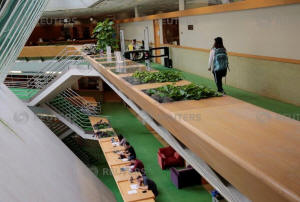|
Fewer foreign students coming to United
States for second year in row: survey
 Send a link to a friend
Send a link to a friend
 [November 13, 2018]
By Yeganeh Torbati [November 13, 2018]
By Yeganeh Torbati
WASHINGTON (Reuters) - The number of
international students entering U.S. colleges and universities has
fallen for the second year in a row, a nonprofit group said on Tuesday,
amid efforts by the Trump administration to tighten restrictions on
foreigners studying in the United States.
New enrollments for the 2017-18 school year slumped 6.6 percent compared
with the previous year, according to an annual survey released by the
Institute of International Education. That follows a 3.3 percent decline
in new international students tallied in the 2016-17 academic year.
Several factors are driving the decrease. Visa and immigration policy
changes by the Trump administration have deterred some international
students from enrolling, college administrators and immigration analysts
said.
A strong dollar has made U.S. college tuition relatively more expensive,
Canadian and European universities are competing fiercely for the same
students and headlines about mass shootings also may have deterred some
students, said Allan Goodman, president of IIE.

"Everything matters from safety, to cost, to perhaps perceptions of visa
policy," Goodman said. "We're not hearing that students feel they can't
come here. We're hearing that they have choices. We're hearing that
there's competition from other countries."
International students have become an important funding source for
American colleges as traditional revenue sources, such as state funding,
come under pressure. Most undergraduate foreign students do not qualify
for need-based financial aid and must pay close to full tuition and fees
to attend U.S. schools.
Similar to previous years, the largest numbers of students came from
China, India and South Korea, which together made up 56.1 percent of all
international students.
IIE did not track new international student numbers before the 2004-05
school year, but Goodman said the recent declines in new enrollments
were comparable to the period after the Sept. 11, 2001 attacks. The
annual survey of foreign-student enrollment is funded by the U.S. State
Department.
Some immigration policy experts and college administrators attribute the
decline to the Trump administration's drive to restrict immigration and
an overall sense of a U.S. political climate that is hostile to
immigrants and foreigners.
"It is not a welcoming environment," said Doug Rand, a former White
House official working on immigration issues during the Obama
administration.

He noted that Trump has moved to restrict the issuance of skilled-worker
visas and permanent residency, which many incoming students may apply
for in the future.
"It's an act of willful ignorance to suggest that our immigration
policies aren't having a direct impact on foreign student enrollment,"
Rand said.
[to top of second column]
|

Students study in the Allan and Alene Smith Law Library addition at
the University of Michigan in Ann Arbor, Michigan, U.S., September
20, 2018. REUTERS/Rebecca Cook

Caroline Casagrande, a State Department official, said the
"flattening" in international student enrollments began with the
2015-2016 year, prior to the start of the Trump administration. That
year, new enrollments still increased by 2.4 percent compared with
the prior year.
"The U.S. Department of State is committed to facilitating the
legitimate travel to the United States of individuals who want to
study in U.S. academic institutions," Casagrande said during a phone
call with reporters. "It's quite frankly unwarranted to say that it
is completely the result of a political environment."
Cary Jensen, assistant vice provost for international advocacy and
engagement at the University of Rochester in New York, said
international students had been receiving more scrutiny from the
U.S. government since the Sept. 11 attacks, but that "this last year
and a half has just taken it to another level."
Jensen said a major issue facing American universities was the lack
of clarity surrounding the Trump administration's policies, in part
due to lengthy court battles over policies like Trump's travel ban
on people from several Muslim-majority countries.
"That has kind of been the worst part of this, is the uncertainty,"
Jensen said. "That breeds fear and people tend to overreact."
The administration is pursuing concrete steps to restrict visa
policy regarding international students. Last month, it said it
would seek to establish a fixed maximum period of stay for
international students. Students currently can stay for an
indefinite duration of study, and exchange advocates worry such a
change would make it harder to recruit students and limit their
flexibility once they are in the country.

In August, the administration changed the way international and
exchange visitors are found to accrue "unlawful presence," a
violation that could result in being barred from the country for up
to 10 years. Several colleges sued over the change, arguing it would
cause the "banishment of untold numbers of international students
and exchange visitors acting in good faith."
The total number of new international students in the United States
in 2017-2018 grew by 1.5 percent to a record high of nearly 1.1
million, but it was the smallest year-over-year increase since 2005.
The growth in total enrollment was driven by a nearly 16 percent
increase in the number of students opting to remain in the United
States after finishing their studies for short-term work known as
"optional practical training."
(Reporting by Yeganeh Torbati; Editing by Marla Dickerson and Dan
Grebler)
[© 2018 Thomson Reuters. All rights
reserved.]
Copyright 2018 Reuters. All rights reserved. This material may not be published,
broadcast, rewritten or redistributed.
Thompson Reuters is solely responsible for this content. |